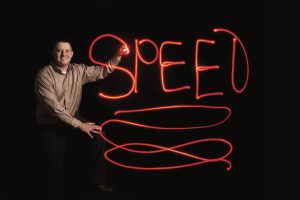
Using a $2 million grant from the National Institutes of Health’s National Institute of Neurological Disorders and Stroke, Mark Foster, associate professor in the Department of Electrical and Computer Engineering, is leading a team that is developing a multiphoton microscope system that will enhance the recording and monitoring of neuronal activity, allowing scientists to see how our brain cells work in greater detail. He is working on the project with Andreas Andreou and Trac Tran, professors in electrical and computer engineering, and Patrick Kanold, a professor in the Johns Hopkins Department of Biomedical Engineering.
The Coded Raster Scanning Hybrid (CRaSH) microscope overcomes current limitations in capturing brain activity with innovative scanning methods and specialized codes. It records millions of neurons per second across three developmental stages, improving speed and precision. Foster’s team aims not only to develop the CRaSH microscope but also to create adaptive hardware and software and validate its potential for in vivo 3D functional circuit research in the auditory cortex. The researchers say this has the potential to transform our grasp of neural networks and advance brain research.
Foster’s work focuses on combining photonics and electronics to create new technology for imaging and sensing systems. His research has far-reaching applications in fields like optical communications, microwave photonics, and high-speed optical imaging. His lab specializes in manipulating signals at lightning-fast speeds, shaping the future of technology and how we capture and use images. He is also the associate head of graduate education in the department.